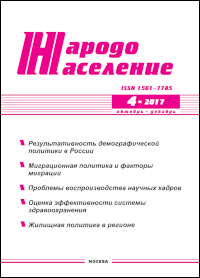Проблемы воспроизводства научных кадров глазами руководителей институтов
Выражение признательности
проект финансировался за счет бюджетных средств (Госзаказ)
Для цитирования
Ярашева А. В., Аксенова Е. И. Проблемы воспроизводства научных кадров глазами руководителей институтов // Народонаселение. 2017. Том 20. № 4. С. 105-118.
Аннотация
В статье представлены результаты исследования кадрового потенциала российских научных организаций, выполненного Институтом социально-экономических проблем народонаселения РАН в 2015-2016 годах. Использование социологического метода качественного интервью (экспертный опрос) дало возможность выявить проблемы воспроизводства кадров в российских научных учреждениях. Рассматриваются проблемные зоны в возрастной структуре работников и возможностях формирования кадрового резерва. Выявлено мнение руководителей научных учреждений относительно приоритетов профессиональных компетенций и существующих возрастных ограничений для директоров, необходимости мобильности кадров. Сделаны выводы относительно уровня и качества исследований в научных учреждениях и высших учебных заведениях, а также качества подготовки молодых специалистов и стимулов привлечения молодых ученых в академическую науку для сохранения преемственности научных школ. Несмотря на то, что в большинстве российских научных учреждений уже имеется внутренний кадровый резерв для занятия не только высших руководящих должностей, но и руководителей среднего звена, отмечена важность самого принципа формирования кадрового резерва. Этот процесс не может быть формализованным, а должен представлять собой качественную подготовку специалистов к их продвижению по карьерной лестнице. Подготовка кадрового резерва включает постоянное повышение квалификации в области как научных, так и управленческих компетенций, передачу опыта от старшего поколения к младшему, системный анализ результатов научной деятельности ученых, наставничество, активное участие кандидатов в кадровый резерв в научных мероприятиях и обсуждении вопросов, касающихся деятельности организации.
Ключевые слова:
кадровый потенциал, научные организации, экспертный опрос, профессиональные компетенции, молодые ученые, формирование кадрового резерва, мобильность кадров
Литература
Максимова Л.В., Гнездилов Е.А., Максимов И.С. Анализ научных подходов к определению понятия «кадровый потенциал организации» // Направления модернизации современного инновационного общества: экономика, социология, философия, политика, право. Материалы Международной научно-практической конференции. — М.: Академия управления, 2015. — С. 81-84.
Гохберг Л.M., Шувалова О.Р. Общественное мнение о науке / Центр исследований и статистики науки. — М., 1997. (Серия «Мониторинг рос. науки»). — 92 с.
Зубова Л.Г. Кадровый потенциал российской науки // Вестник Российской академии наук. — 2012. — Т. 82. — № 8. — С. 712-718.
Шарый И.Н. Особенности и проблемы воспроизводства кадрового потенциала науки при переходе к развитию высокотехнологичной инновационной экономики // Социологический альманах. — 2014. — № 5. — С. 346-357.
Александрова О.А, Ярашева А.В., Бурдастова Ю.В. Актуальные проблемы формирования кадрового потенциала научных организаций // Право и образование. — 2016. — № 12. — С. 31-41.
Гохберг Л.М. Кадровый потенциал российской науки // Высшее образование в России. — 2002. — № 4. — С. 8-21.
Варшавский Л.Е. Проблемы развития кадрового потенциала науки // Наука. Инновации. Образование. — 2006. — № 1. — С. 90-103.
Леонидова Г.В. Интеграция науки и образования — важнейший фактор развития кадрового потенциала науки // Проблемы стратегии и тактики регионального развития. — 2003. — Т. 1. — С.131-135.
Гохберг Л.M., Шувалова О.Р. Общественное мнение о науке / Центр исследований и статистики науки. — М., 1997. (Серия «Мониторинг рос. науки»). — 92 с.
Зубова Л.Г. Кадровый потенциал российской науки // Вестник Российской академии наук. — 2012. — Т. 82. — № 8. — С. 712-718.
Шарый И.Н. Особенности и проблемы воспроизводства кадрового потенциала науки при переходе к развитию высокотехнологичной инновационной экономики // Социологический альманах. — 2014. — № 5. — С. 346-357.
Александрова О.А, Ярашева А.В., Бурдастова Ю.В. Актуальные проблемы формирования кадрового потенциала научных организаций // Право и образование. — 2016. — № 12. — С. 31-41.
Гохберг Л.М. Кадровый потенциал российской науки // Высшее образование в России. — 2002. — № 4. — С. 8-21.
Варшавский Л.Е. Проблемы развития кадрового потенциала науки // Наука. Инновации. Образование. — 2006. — № 1. — С. 90-103.
Леонидова Г.В. Интеграция науки и образования — важнейший фактор развития кадрового потенциала науки // Проблемы стратегии и тактики регионального развития. — 2003. — Т. 1. — С.131-135.
Форматы цитирования
Другие форматы цитирования:
APA
Ярашева, А. В., & Аксенова, Е. И. (2017). Проблемы воспроизводства научных кадров глазами руководителей институтов. Народонаселение, 20(4), 105-118. извлечено от https://www.jour.fnisc.ru/index.php/population/article/view/6571
Раздел
КАДРОВЫЕ ПРОБЛЕМЫ РАН








